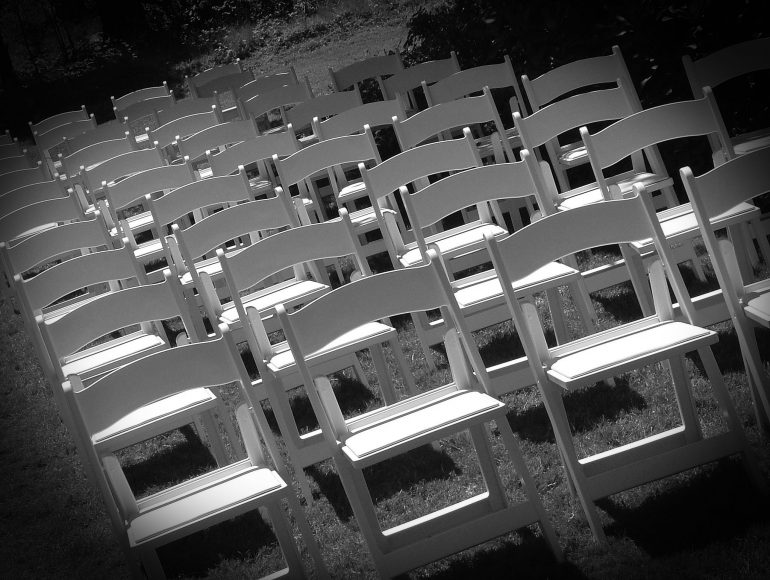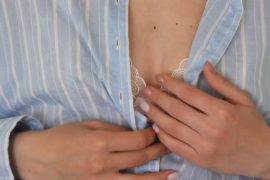Julia Dixon Evans

The first time I thought about love was with an English girl my same age, tucked away behind moss-rimmed trees, dreaming of adventures and heroes, in a campsite on the west coast of France many years ago.
She touched my face and whispered that we were a tragical pair, a prince and a princess kept apart by oceans and ice and storms and wars. “You can be the prince,” she said.
My daughter, Marie, reads the newspaper every morning. Not all of it —the headlines and photo captions first, then only the things she deems meaningful, or worthy. She is so smart, and so careful.
She gets her intelligence from her father. Her patience, too, although what I have is something like patience. It’s more just: I like to be quiet. I like to wait.
When Jack and I were sixteen, he sat next to me on the bus after school and asked me if I’d ever kissed anyone. I didn’t answer, but I looked at him with something like fear, something like patience on my face. He kissed me and smiled, touched my face with the back of his hand. He said, “Well now you have,” and I never corrected him.
“I’ve been having visions again,” Marie tells me with the morning light slung low and golden across her face. Our kitchen is the biggest room in this small house and I’ve always felt the most like a mother here.
My breath catches. “Bad ones?”
“They’re not good,” she says.
This is the month Marie goes to college, a campus on the coast with hardly any trees and brutalist concrete everywhere. I’d never set foot on a college campus until we drove the two hours out to the coast for a tour, but this was not what I pictured. I had higher hopes — wild spaces that grow wild minds with poetry and science.
“Should I just put ‘high school diploma’ for you?” Marie had asked when filling out applications. They all asked about her parents, as if places I haven’t been and things I haven’t learned can tell them what kind of things a daughter can learn. “Because there’s an option for ‘some college,’ like if you took a few courses somewhere or did a certificate program.”
I’d looked at her and tried to be soft. Something like patience. “No college, Marie.” The only trace of my French that remains is when I say her name. I say her name as much as I can. “I just always had you,” I said, and kissed her on the forehead.
When Marie leaves, I don’t know what I will have left to be patient for.
In my email there’s a name I had nearly forgotten.
Dearest Emi, I saw your name and knew it was you. Your art in the nature center. It’s a stretch, but I suppose I was trying to find you. I’m in the U.S. now too. I’m getting married in California this month and I know it’s silly but I had this dream of having someone from every stage of my life at the ceremony. When I think of that time between childhood and womanhood, I think of you.
Your sculptures are exquisite. I am not surprised. Remember the worlds we’d build together?
Always,
Katherine
The desert is cool tonight, for September. It’s a sweetness we don’t get a lot of. I cook a late, lazy dinner: greens, fried egg, pan-crisp toast, and we bring it outside. This is home, I think. This is, also, a long way from home.
“Your father is coming soon, Marie,” I say. “He’s going to stay with us until move-in day, did he tell you that yet?”
“Maybe he can have my room and I’ll bunk with you,” Marie says, mouth stuffed.
“Don’t you want to spend your last days in your own room?”
“Okay, then you can stay with me,” she says, a grin. My house is very small but it is full enough.
We wrote letters for a few years as children, until I moved even further away and lost her address. Pink paper, wide-rule. Drug-store stickers on the envelope. Every letter a continuation of some fantasy, some story we’d started acting out together. In one: a princess, lost, wounded, saved by the foxes and stags that licked her wounds clean. I had tied daisies into tiny knots, dozens, hundreds, and wove them into a lace with wool we found in a basket in the cafe. “Your veil,” I announced, draping it across her freckled cheeks. Another: two warriors, sisters, flying straight into battle, a plane goes down, one sister’s quest to find and save the other. That day I had stolen a knife from my parents’ tent and carved sticks into tiny pieces to craft a propeller plane (stuck together with the tiniest bits of spearmint gum we’d methodically chew and save for the project) (every minute felt important and at the same time, somehow gloriously lazy and wasted). We never, ever told or wrote anything other than happy endings.
“Who is Katherine?” Marie asks.
“She’s a childhood friend,” I say. “I haven’t spoken to her in decades.”
“So… let me get this straight. She found your art and now we’re going to her wedding?”
“Yes?” I say.
When Marie was very small, every so often she’d suffer what at first I called a “waking nightmare.” For a long time — years — Marie wouldn’t tell me what she saw, but instead would tell me things to say, requested reassurances sown like clues. “Tell me I will always have eyes.” “Tell me there is only solid ground under the house.” “Tell me you are a real person.” “Tell me it is safe to eat.” “Tell me the wind is gentle.” “Tell me I will always be nice.” “Tell me I am me.”
All I could do was say yes, yes, yes and stitch it together like patchwork.
When she was eight, she told me the entirety of one. She described it as “the vision did this” but I heard it as a someone, a thing, an evil.
That night we had sat together at my drawing table and we tried to find a way for her to reclaim her mind. The sculptor-mother, worn down to the only thing she knew how to do. We cut out tiny shapes and shadows and figures out of black and white paper. I asked her which thing was the biggest and she knew what I meant right away and touched a rectangle she said was a door. I asked her where the door went but she just shrugged. We used mounting pads and set the door the highest off the flat plane. We set the entire vision onto one small square of paper, inside its bounds, each piece of her haunting casting its own shadows.
“See here, Marie, it’s stuck here now,” I said. “Glued. It can’t grow. It can’t get to you.”
Soon her visions consumed page after page, stacked on bookshelves, shoved into boxes, burned on the desert floor behind the house.
“You’re an artist too, Marie,” I once said.
“I am not,” Marie snapped. “I am not.”
By age thirteen, the visions had mostly stopped. She’d had one last June, the shortest night of the year, but she didn’t tell me the details. She didn’t make any art. Sometimes I think she reads the newspaper every day to stay grounded in reality and sometimes I think she’s looking for clues.
With Jack driving, Marie in the backseat, in our finest clothes, the windows down, it feels like we’re a real family. I say it out loud. “This feels like we’re a real family.”
Jack laughs. Marie says “Mom, we are.” I don’t know how she got so good.
At the wedding, Katherine is beautiful, though I do not know her. I don’t recognize the tragic heroes in our old stories, the princesses, the foxes and stags, the warrior sisters.
I am idly speaking with Katherine’s friend from college when I see Marie approaching, pure terror on her face. I haven’t seen this expression in years. She pulls me aside.
“Mama,” Marie says, desperate, through her teeth, she hasn’t called me mama in probably five years. “I can’t stop it. It feels like it’s right here and right now.”
She groans, sitting in a bouquet-embellished folding chair and pulling her knees to her chin, curling up. I can’t take my eyes off her, but I’m aware that people are probably seeing this. “Mama, it’s real. This is the vision. We need to leave.”
“It’s not real, Marie,” I tell her, crouching to her level. Reassurances. I can do this. “It’s not here. Marie you are real and you are alive and nothing is going to hurt you.”
Anger flashes across her face. She is not reassured.
“Emi.” Katherine’s clear voice comes from behind me. “It is so lovely to see you. Is this your own daughter?” she asks, and it’s a strange phrasing. My own.
“Hello Katherine. Yes, this is Marie,” I say. I have to acknowledge this. “She’s having… a panic attack.”
Katherine lifts her gown by the fistfuls and squats in front of Marie. Her arms are wiry and muscular and my fingers twitch to touch them, to feel their grooves and ridges. There is nothing soft here about Katherine when all of my memories are just that: soft.
“Darling, this happens to me all the time,” she says. “Let me talk you through it.”
And it’s almost simultaneous — simultaneous enough to cast the blame — that a shadow (thick and inexplicable, unreal) sweeps over the entire outdoor seating area, not just blocking the sun but sending us into a glued-shut darkness — and then Marie roars.
“Get away,” she shouts. “The ground, it’s going to give.”
It starts as a tremble, subtle enough to feel like the sound of a passing big rig on the highway, and mostly all I feel is cold, so cold. I want to be back in the desert where all I feel is warm. I wish, most of all, that I’d never brought Marie here.
“Everybody inside!” Katherine screeches into the whirl of gusts and noise. This is no earthquake. New rules. She spins around, snapping effortlessly into this leadership role and I feel so unlike her. She ushers her small cohort of guests toward the lodge’s front door. Jack’s there, waiting for us, but he doesn’t go in. Holding Marie’s hand, I pull her along too, but she soon stops, dragging her feet, shaking her head, eyes hot, live-wired. She will not go inside. And right when she weakly lifts her forefinger to point to the door, I hear the screams, a chorus. Layers of voices, a massive sound like a blast, then silence.
I pull Marie towards me and say “I’m sorry” against the top of her head. I think I mean for right now and I think I mean for her entire life, for letting her think this could have been explained or therapied or paper cut away.
“What else is going to happen, Marie?” I ask, slowly. “How do you get out?” I shake her shoulders. “Think, Marie. You have to remember.”
She looks right at me. Jack approaches. He’s still holding the small silver-wrapped gift I made for Katherine: a paper cut relief of our childhood fantasies, like Marie’s childhood terrors, but tinier, and happier.
“We have to leave. Run,” she says and we run until our legs burn.
In the end, it’s quiet. Marie breathes slowly, and it’s all I hear. There’s no sound from the wedding. The sky is back to normal, but it feels ten times brighter. I am so cold.
“You are okay,” I say. Reassurances, something like patience. I try to remember them all. “The ground is still. You have everything. I am a real person. The wind is gentle. You are you.”
“It’s done, mama,” she says.
Once upon a time there were two little girls surrounded by mossy trees, dreaming up stories and golden-lit souls, adventures and violence, terror and justice — we’d grasp at any wild idea just to feel alive, just to feel a sliver of magic. And I remember one little girl, terrified, wanting to do anything to cut out whatever her mind was capable of.
Julia Dixon Evans is the author of the novel How to Set Yourself on Fire (Dzanc Books, 2018). Her writing can be found in McSweeney’s, Hobart, The A.V. Club, Literary Hub, Pithead Chapel, Paper Darts, and elsewhere. Her short story “Vinegar on the Lips of Girls” won the 2019 National Magazine Award for Fiction. Twitter: @juliadixonevans



